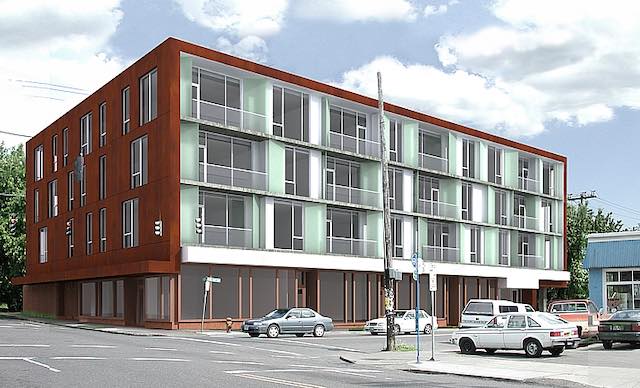Many surveys have found that the vast majority of Americans, including Millennials, prefer or aspire to live in single-family homes. But surveys rarely ask whether they prefer that single-family home to be in a low-density neighborhood or if they would mind living next to a bunch of apartment buildings.
Would you want one to move next-door to your single-family home? This is real affordable housing, by the way: one of these condos is currently selling for $527 per square foot.
However, a polling firm called YouGov recently asked Americans whether they thought low-density neighborhoods were better than high-density ones. Specifically, they were asked whether low densities meant more or less congestion, more or less crime, and were better or worse for the environment. Planning advocates, of course, claim that high densities mean less congestion, are better for the environment, and have less crime because there are more “eyes on the street.”
Those density advocates apparently haven’t been able to persuade most Americans that densities are better. According to the survey, 75 percent of Americans think that low densities are better for the environment, 60 percent think low-density neighborhoods are less congested, and 62 percent think they suffer less crime. I happen to agree with the majority on all three points, but whether you agree or not, it is clear that most Americans want to live, not just in single-family homes, but in low-density neighborhoods.
The survey also asked another question: should people be free to buy land and develop it as they please or should the government limit where they can build things? A smaller majority, 55 percent, believed people should be free to develop real estate as they please. Does that mean they oppose single-family zoning? Or does it mean they oppose restrictions on rural development?
Developers learned in the 1890s that Americans would more readily buy homes if the properties they bought, and their neighbors, were deed-restricted to have nothing more than single-family homes. Zoning was developed in the early 1900s to emulate deed restrictions in single-family neighborhoods that had been built before the widespread use of deed restrictions. This gave people confidence that their neighborhood densities would remain low and, as a result, urban homeownership rates increased by 150 percent by 1930.
If zoning hadn’t been invented, all or nearly all single-family developments built since 1900 would have deed restrictions maintaining low densities. I don’t mind getting rid of zoning so long as residents can easily add deed restrictions to all of the homes in their neighborhoods. Houston allows this with a vote of 75 percent of homeowners in a neighborhood. But to abolish single-family zoning with the goal of densifying neighborhoods with apartment buildings betrays the interests and desires of the residents of those neighborhoods.
Just as it is easy to persuade voters to support transit for other people to ride so most people can drive on less congested roads, it is probably easy to persuade voters to support high-density development for other people in some other neighborhood. Demanding residents of single-family neighborhoods to accept high-density apartment buildings in their midst always faces more opposition because residents of those neighborhoods know that density means more congestion, more crime, and is bad for the environment.









Duhh. Also water is wet.
It’s not an issue of density. I lived in a suburban community that also had apartments. Mixed
Single detached homes, connected town homes and 3 story apartments….ALL in the same place.
https://www.google.com/maps/place/3600+Dorshire+Ct,+Pasadena,+MD+21122/@39.131445,-76.5239859,17z/data=!4m2!3m1!1s0x89b7fec0f3933679:0xa5373ca0e8128d8e
Nice place. It ain’t what you have it’s who you let in. Discrimination is wrong. Scrutiny isn’t. When homes were converted to section 8 it became a welcome mat for inevitable crime. Suburbs are often used by city dwellers as drop off points for meetings and deals. i.e. drugs.
Unlike cities cops don’t patrol here. There’s little need…
Leftists argue America’s crime rate is embarrassingly high compared to European and Japan as I’ve been trolled by MrPoohead on disqus. Feel free to trash him.
The real reason for violent crime stats is how we measure. Murder rates in EU and Japan are based on Convictions and indications of foul play.
UK “murder” rates are based on convictions; most don’t know that & Press certainly isn’t going to tell them, cities like Chicago “clearance by arrest” is 21%,conviction rate even lower, the “murder” rate in Chicago would be about that of London applied UK standards.
In the US autopsy is ubiquitous even if murder is not paramount. US also defines homicide more diversity for tort and legal reasons. EU and Asian national views on suicide,
Abortion and death undisclosed. Japan’s cultural stigma of handling the dead..means they don’t do a lot of autopsies to confer four play. Also why would a country that bills itself with such low crime need the death penalty and use it quite extensively.
EU and Japan are tourism and travel economy nations, a sizeable chunk of their economy is dependent on foreign visitation so they cook the books statistically to defer homicide and violence.
80% of all violent crime in the US is geographically isolated to just a dozen democratic run Major inner cities. One third of the nation’s federal prison population is non-US citizens.
Just a sad example of bad ingredients to the melting pot.
You can solve the Drug war in America in 24 hours…..Give em ID cards with body autonomy laws…In exchange for right to use whatever narcotic, in EXCHANGE, surrender all public funded obligations…. no unemployment, no Food stamps, No HUD benefits.
”
If zoning hadn’t been invented, all or nearly all single-family developments built since 1900 would have deed restrictions maintaining low densities. I don’t mind getting rid of zoning so long as residents can easily add deed restrictions to all of the homes in their neighborhoods.
” ~ anti-planner
That’d be my guess, too.
Even if that weren’t the case, we’d see it today with HOAs.